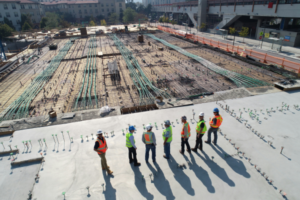Understanding ERP and its Importance in Construction Projects
Enterprise Resource Planning (ERP) is a comprehensive software system that integrates various business functions and processes into a single platform. In the context of construction projects, ERP solutions play a crucial role in enhancing efficiency, productivity, and collaboration across different project phases.
What is ERP?
ERP systems are designed to automate and streamline core business activities, including project management, resource allocation, financial management, procurement, inventory control, and more. By centralizing data and providing real-time access to information, ERP solutions enable construction companies to make informed decisions, optimize resource utilization, and improve overall project performance.
The Importance of ERP in Construction Projects
Enhanced Project Management and Planning
One of the primary benefits of implementing ERP solutions in construction projects is improved project management and planning. ERP systems offer robust project management tools that allow for effective scheduling, task allocation, and resource planning. With real-time visibility into project progress, construction managers can identify bottlenecks, allocate resources efficiently, and ensure timely completion of tasks.
Streamlined Resource and Inventory Management
Efficient resource and inventory management are vital for construction projects to stay on track and within budget. ERP solutions provide a centralized platform to manage and track resources, such as equipment, materials, and labor. By automating processes like procurement, inventory control, and equipment maintenance, construction companies can optimize resource utilization, reduce costs, and minimize downtime.
Effective Financial Management
Construction projects involve complex financial transactions, including budgeting, invoicing, cost tracking, and reporting. ERP systems offer robust financial management modules that streamline these processes, ensuring accurate tracking of project costs, timely invoicing, and effective budget management. By integrating financial data with project management information, ERP solutions enable construction companies to have a holistic view of project profitability and financial health.
Real-time Reporting and Analytics
Access to real-time data and analytics is crucial for informed decision-making and proactive project management. ERP solutions provide comprehensive reporting and analytics capabilities, enabling construction companies to generate customized reports, track key performance indicators (KPIs), and gain actionable insights. Real-time visibility into project progress, financial performance, and resource utilization empowers stakeholders to make data-driven decisions and address issues promptly.
Conclusion
Understanding the concept of ERP and its importance in construction projects is the first step towards successful implementation. ERP solutions offer a wide range of functionalities that can revolutionize project management, resource allocation, financial management, and reporting in the construction industry. By leveraging the power of ERP, construction companies can enhance their operational efficiency, maximize profitability, and deliver successful projects. In the next section, we will explore the specific key functions that ERP solutions provide in construction projects.
Key Functions of ERP Solutions in Construction
ERP solutions in construction offer a multitude of key functions that cater to the unique needs and challenges of the industry. These functions are designed to streamline operations, enhance collaboration, and improve overall project performance. In this section, we will explore the primary key functions of ERP solutions in construction projects.
Project Management and Planning
Effective project management and planning are critical for the successful execution of construction projects. ERP solutions provide robust project management tools that enable construction companies to plan and schedule tasks, allocate resources, track progress, and manage project timelines. With features like Gantt charts, resource management modules, and collaborative communication platforms, ERP systems enhance project coordination and ensure timely completion of tasks.
Resource and Inventory Management
Efficient resource and inventory management are essential for construction projects to operate smoothly. ERP solutions offer functionalities to track and manage various resources, including equipment, materials, and labor. Construction companies can utilize ERP systems to centralize resource data, monitor availability, schedule maintenance, and optimize resource allocation. This helps in reducing costs, avoiding resource conflicts, and ensuring optimal resource utilization throughout the project lifecycle.
Financial Management
Accurate financial management is crucial for the financial health and profitability of construction projects. ERP solutions provide comprehensive financial management modules that handle budgeting, cost tracking, invoicing, and financial reporting. Construction companies can leverage ERP systems to track project costs, manage budgets, generate invoices, and streamline financial processes. By integrating financial data with project management information, ERP solutions enable real-time financial visibility and informed decision-making.
Real-time Reporting and Analytics
Access to real-time reporting and analytics is vital for construction companies to track project performance and make informed decisions. ERP solutions offer robust reporting and analytics capabilities that provide stakeholders with detailed insights into project progress, resource utilization, budget variances, and more. Customizable dashboards, KPI tracking, and data visualization tools enable construction companies to monitor key metrics, identify trends, and take proactive actions to optimize project outcomes.
Collaboration and Communication
Effective collaboration and communication are essential for the seamless coordination of construction projects. ERP solutions facilitate collaboration by providing centralized platforms for document management, project communication, and team collaboration. Features like document sharing, task assignment, and real-time messaging enable project teams to work together efficiently, share information, and ensure effective communication across different stakeholders.
Conclusion
The key functions offered by ERP solutions in construction projects are instrumental in enhancing project management, resource allocation, financial management, reporting, and collaboration. By leveraging these functions, construction companies can streamline operations, optimize resource utilization, improve financial control, and drive project success. In the next section, we will delve into the step-by-step process of implementing ERP solutions in construction projects.
Steps to Implementing ERP Solutions in Construction Projects
Implementing ERP solutions in construction projects requires careful planning, preparation, and execution. In this section, we will outline the step-by-step process to successfully implement ERP solutions in construction projects.
Assessing Your Business Needs
The first step in implementing an ERP solution is to assess your specific business needs and requirements. Take the time to evaluate your current processes, pain points, and areas for improvement. Identify the key functionalities and features you require in an ERP system, such as project management, resource allocation, financial management, reporting, and collaboration. Engage stakeholders from different departments to gather their input and ensure that the chosen ERP solution addresses their specific needs.
Choosing the Right ERP Solution
Once you have assessed your business needs, it’s time to choose the right ERP solution for your construction projects. Conduct thorough research and evaluate different ERP vendors based on factors such as industry experience, reputation, functionality, scalability, and support services. Consider factors like ease of use, integration capabilities, mobile accessibility, and customization options. Request demos, speak with vendor representatives, and gather feedback from other construction companies who have implemented ERP solutions. Choose an ERP solution that aligns with your business needs and has a proven track record in the construction industry.
Planning and Preparing for Implementation
Before implementing the chosen ERP solution, careful planning and preparation are essential. Create an implementation plan that outlines the timeline, milestones, and responsibilities for each phase of the implementation process. Identify the necessary resources, including personnel, hardware, and software requirements. Develop a data migration plan to ensure a smooth transition from existing systems to the ERP solution. Create a communication plan to keep all stakeholders informed about the implementation process and address any concerns or questions.
Training for Users
Proper training for users is crucial to ensure a successful ERP implementation. Provide comprehensive training sessions to all employees who will be using the ERP system. This includes project managers, site supervisors, accountants, procurement staff, and any other relevant personnel. Training should cover the basic functionalities of the ERP system, as well as any specific modules or features that are relevant to each user’s role. Consider providing ongoing training and support to ensure that users are comfortable and proficient in utilizing the ERP solution.
Testing and Going Live
Before fully deploying the ERP solution, thorough testing is necessary to identify and resolve any issues or bugs. Conduct testing in a controlled environment to ensure that all functionalities are working as intended. Test different scenarios and workflows to validate the system’s performance and accuracy. Once testing is complete and any necessary adjustments have been made, it’s time to go live with the ERP solution. Develop a plan for transitioning from existing systems to the ERP solution, ensuring minimal disruption to ongoing projects and operations. Monitor the system closely during the initial period to address any post-implementation issues promptly.
Conclusion
Implementing ERP solutions in construction projects requires careful planning, choosing the right solution, thorough preparation, training, and testing. By following these steps, construction companies can successfully deploy ERP solutions that streamline processes, enhance collaboration, and improve project outcomes. In the next section, we will discuss the challenges that may arise during the implementation process and strategies to overcome them.
Challenges in Implementing ERP Solutions and How to Overcome Them
Implementing ERP solutions in construction projects can present various challenges that need to be addressed to ensure a successful implementation. In this section, we will explore some common challenges that construction companies may encounter during the implementation process and provide strategies to overcome them.
Resistance to Change
One of the significant challenges in implementing ERP solutions is resistance to change from employees. Employees may be accustomed to their existing systems and processes, which can lead to resistance and reluctance to adopt the new ERP solution. To overcome this challenge, it’s crucial to involve employees from the early stages of the implementation process. Provide clear communication about the benefits of the ERP solution, address any concerns, and highlight how the new system will streamline their work and improve efficiency. Offer training and ongoing support to help employees become comfortable with the new system and address any issues or questions they may have.
Data Migration Issues
Data migration from existing systems to the new ERP solution can be complex and challenging. Inaccurate or incomplete data migration can lead to data integrity issues and impact the functionality of the ERP system. To overcome this challenge, invest time and resources into proper data cleansing and validation before migrating data. Develop a comprehensive data migration plan, ensuring that all necessary data is transferred accurately to the new system. Conduct thorough testing and verification of the migrated data to ensure its integrity. Consider working with experienced consultants or IT professionals to assist with the data migration process.
Ensuring User Adoption
Ensuring user adoption of the new ERP solution is crucial for its success. If employees do not embrace the new system and continue to rely on old processes, the benefits of the ERP solution may not be fully realized. To overcome this challenge, provide comprehensive training and support to employees. Clearly communicate the importance of using the ERP system and highlight how it will improve their work efficiency and productivity. Encourage feedback from users and address any issues or concerns promptly. Consider designating power users or champions within the organization who can help promote the use of the ERP system and provide support to their colleagues.
Integrating with Existing Systems
Integrating the new ERP solution with existing systems and software can be a challenge, especially if there are compatibility issues or complex integration requirements. To overcome this challenge, conduct a thorough analysis of existing systems and identify any integration needs early in the implementation process. Work closely with the ERP vendor or consultants to develop a detailed integration plan. Ensure that proper APIs or integration tools are available to facilitate seamless data exchange between systems. Conduct rigorous testing to verify the integration and address any issues or errors that may arise.
Conclusion
Implementing ERP solutions in construction projects can face challenges such as resistance to change, data migration issues, user adoption, and system integration. By proactively addressing these challenges and implementing strategies to overcome them, construction companies can ensure a successful ERP implementation. In the next section, we will discuss how to measure the success of ERP implementation in construction projects and optimize the system over time.
Measuring the Success of ERP Implementation in Construction
Measuring the success of ERP implementation in construction projects is crucial to determine the effectiveness of the system and identify areas for improvement. In this section, we will explore the key steps involved in measuring the success of ERP implementation and optimizing the system over time.
Defining Key Performance Indicators (KPIs)
To measure the success of ERP implementation, it’s essential to establish Key Performance Indicators (KPIs) that align with the goals and objectives of the construction projects. KPIs can include metrics such as project completion time, resource utilization, cost variance, productivity improvement, and customer satisfaction. By defining measurable KPIs, construction companies can objectively assess the impact of the ERP system on project performance.
Continuous Monitoring and Evaluation
Monitoring and evaluating the performance of the ERP system on an ongoing basis is critical to identify any issues or areas for improvement. Regularly review and analyze the data generated by the ERP system to track the progress of projects, resource utilization, financial performance, and other relevant metrics. Use reporting and analytics tools provided by the ERP system to gain insights into the effectiveness of the implementation. Compare the actual results against the defined KPIs to identify any gaps and take corrective actions as necessary.
Optimizing the ERP System Over Time
ERP systems are not static; they require continuous optimization to adapt to changing business needs and emerging technologies. Regularly review the functionality and performance of the ERP system and explore opportunities for enhancements and customization. Engage with the ERP vendor or consultants to understand the latest updates, features, and best practices. Implement system updates and upgrades to ensure that the ERP solution remains aligned with the evolving needs of the construction projects. Continuously train and educate users to leverage the full potential of the ERP system.
Conclusion
Measuring the success of ERP implementation in construction projects is essential to evaluate the effectiveness of the system and drive continuous improvement. By defining KPIs, monitoring performance, and optimizing the ERP system over time, construction companies can maximize the benefits of the ERP solution and achieve improved project management, resource allocation, financial control, and overall project success. In this ultimate guide, we have explored the importance of ERP in construction projects, the key functions it offers, the implementation process, challenges, and measuring success. By leveraging ERP solutions effectively, construction companies can stay competitive in the industry and deliver successful projects.




